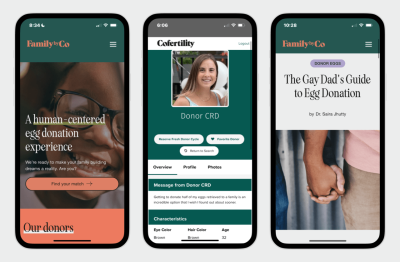Infertility affects an estimated 1 in 8 couples in the U.S., and, while there have been major strides in developing effective fertility treatments, it's often a difficult journey for people trying to build a family.
There’s a fundamental lack of accessible, standardized proactive education and resources, exclusionary costs for egg freezing, a broad lack of support for LGBTQ+ couples and antiquated egg donation and surrogacy programs, according to Lauren Makler, founder of Uber Health.
"If you talk to women who have experienced infertility or LGBTQ+ parents, more often than not, they’ll say they’ve felt failed by the process," she said in an interview.
After leaving Uber Health in 2021, Makler wanted to start a new company in the reproductive health space and connected with Halle Tecco, the founder of reproductive health company Natalist and Rock Health. Makler and Tecco saw an opportunity to create a new model for egg donation and make egg freezing more accessible. They brought on Arielle Spiegel as a co-founder and chief marketing officer and launched Cofertility to rewrite the egg freezing and egg donation experience, Makler said.
Spiegel had created a prior iteration of Cofertility as a fertility education platform.
"So, between the three of us, we have Halle’s decades of experience building and investing in women’s health companies by founding Natalist and Rock Health; Arielle’s expertise in building some of the most beloved brands amongst Gen Z women and a fertility education platform; and my experience at Uber and building Uber Health. As co-founders, it’s our life’s work to give women more power over their reproductive health," Makler said.
Cofertility recently pocketed a $5 million seed round led by Initialized Capital and Brit Morin’s Offline Ventures along with a slate of female angel investors to scale the platform by growing its member base—both donors and intended parents.
The three co-founders built what Makler describes as a "destigmatized, scalable approach" to egg donation, which reshapes the cost structure of egg freezing. The company developed two services—a program that makes egg freezing more accessible and a donor matching program.
Cofertility matches women who want to freeze their eggs with families who could not otherwise conceive. With Cofertility's "Split" program, women can freeze their eggs for free when they donate half of the retrieved eggs to a family who can’t otherwise conceive, according to the company.
The company's "Keep" program allows women to freeze their eggs and store them all for their own later use while still taking advantage of discounts throughout the process to lighten the financial load.

"We see egg donation as a dramatically underserved area within fertility—and a linchpin for unlocking change across several key problem areas within reproductive health," Makler said.
She added, "There's a lot of stigma around egg donation, and that is largely rooted in the cash compensation model. It feels transactional, impersonal and 'icky' for everyone involved: the donor, the intended parent and the donor-conceived child down the line."
According to a recent Harvard study of donor-conceived people, 62% of donor-conceived adults think the exchange of money for donor gametes is wrong, and 41% are “disturbed” by the fact that money was exchanged around their own conception.
"This stigma is an issue on multiple fronts: it discourages women from helping a family grow when that might be something they want to explore, it leaves intended parents with fewer options and resources, and it hurts the LGBTQ community that relies on egg donation for family planning," Makler said.
The overall egg donation experience is also very antiquated and disappointing, she noted. Intended parents scroll through clunky online profiles, spreadsheet lists of donors or through services that overemphasize classist attributes and good looks.
There’s also a lack of ethnic diversity among donors, which leaves intended parents without adequate options for growing a family that reflects their background, Makler said.
The business of fertility treatments is soaring, with analysts expecting the industry to reach $41 billion by 2026. The sector has attracted big investment dollars. In 2021, fertility support startups in the U.S. raised $345 million in venture capital, up 35% from $254 million in 2020, according to data from Rock Health, a venture fund dedicated to digital health.
All three founders had complicated fertility journeys and have a deep understanding of the problem they are trying to solve, she noted.
"By bringing together egg donation and egg freezing in a thoughtful, scalable way, we address some of the key tension points in fertility care: the exclusionary cost of egg freezing, the lack of socioeconomic and racial diversity among egg donors that prohibits intended parents from building the families they want and the antiquated egg donor matching program that feels transactional for both sides," she said.
Cofertility has built a business model based on pricing that makes egg donation and egg freezing more accessible than the traditional donor matching system, according to the company founders.
With traditional donor matching services, intended parents pay an agency coordination fee, they sponsor the cost of the treatment and then they pay a cash compensation fee to the donor. With Cofertility's model, intended parents pay for the coordination and sponsor the treatment—but there is no additional cash comp. The company has developed empathy-led matching programs and offers additional community and educational resources, Makler noted.
The company says it works with a range of clinics to support this model, and all the clinics Cofertility partners with have to report outcomes to the Society for Assisted Reproductive Technology and have a CAP-certified lab to ensure high clinical standards, executives said.
Cofertility also plans to use the seed funding to develop more products and services. "There are so many areas of fertility care and third-party reproduction that are in need of a more human-centered and accessible experience. We intend on building this out based on the feedback and demand that we see from our members," Makler said.